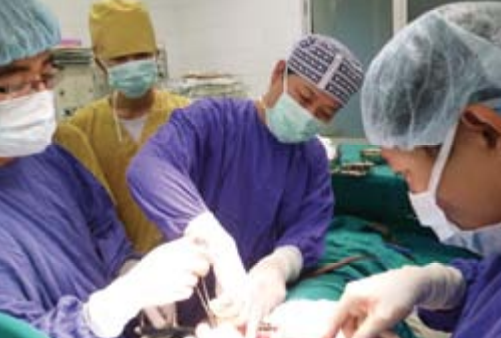Hinari programme enabling Nguyen Duc Chinh to help patients, medical students and his workmates at one of Viet Nam’s leading hospitals.
Published: sábado 29th setembro 2018
Knowledge gained though Research4Life’s HINARI programme is enabling Nguyen Duc Chinh to help patients, medical students and his workmates at one of Viet Nam’s leading hospitals.

Dr Chinh (centre) and colleagues perform surgery. Access to Research4Life’s HINARI programme has led to better outcomes for surgery patients at one of Viet Nam’s leading hospitals.
Viet Duc hospital is the leading surgical centre in Viet Nam. It has 900 beds, more than 1000 staff, 17 clinical departments, and 30 operating tables. Annually, medical staff conduct more than 160 000 consultations and 30 000 operations on more than 40 000 patients. As well as providing patient care, the hospital is engaged in research, public health and teaching, and is a training centre for Hanoi Medical University and several other medical schools nationwide.
Central to the hospital’s mission is its research, which is crucial for staying up to date with, and providing, the best possible treatment and diagnosis. Good research, in short, leads to better patient care. Although the healthcare system has improved markedly in Viet Nam over the past decade, the country still faces many challenges. One of these is a lack of reliable information technology.
Before gaining access to Research4Life’s HINARI programme in 2002, Viet Duc Hospital relied on free public tools, such as Google and PubMed, for literature searches. However, Google is not specialized for medicine and neither Google nor PubMed habitually unearth complete articles. The only other option was to order journals through the mail, which was time-consuming and unaffordable for many Vietnamese physicians.
Dr Chinh now uses HINARI not only to update his own surgical knowledge but also to share information with colleagues who don’t have access to international journals. Such knowledge is also invaluable in his research. In the last few years, Dr Chinh has been able increase his research output substantially. He has now published more than 50 papers – including six in international journals – on medical practice, preventive medicine, infection control and pre-hospital care, as well as textbooks for students.
Dr Chinh relied heavily on HINARI to perform his PhD research on complications of intestinal tuberculosis (TB) and surgical treatment. This is particularly important given the high prevalence of TB in Viet Nam, but the relative lack of information on intestinal TB. Through Research4Life, he was also able to perform extensive research on digestive TB, becoming one of very few Vietnamese doctors to have a paper accepted by the prestigious French journal Annales de Chirurgie.
“With the information and knowledge I obtain,” explains Dr Chinh, “I feel more confident in practising and implementing respected medical expertise from around the world.”
This story is part of “Making a difference: Stories from the field” an illuminating series of case studies providing insights into how access to peer-reviewed research from Research4Life is benefiting the health, well-being, and economic and social development of communities in the developing world.





